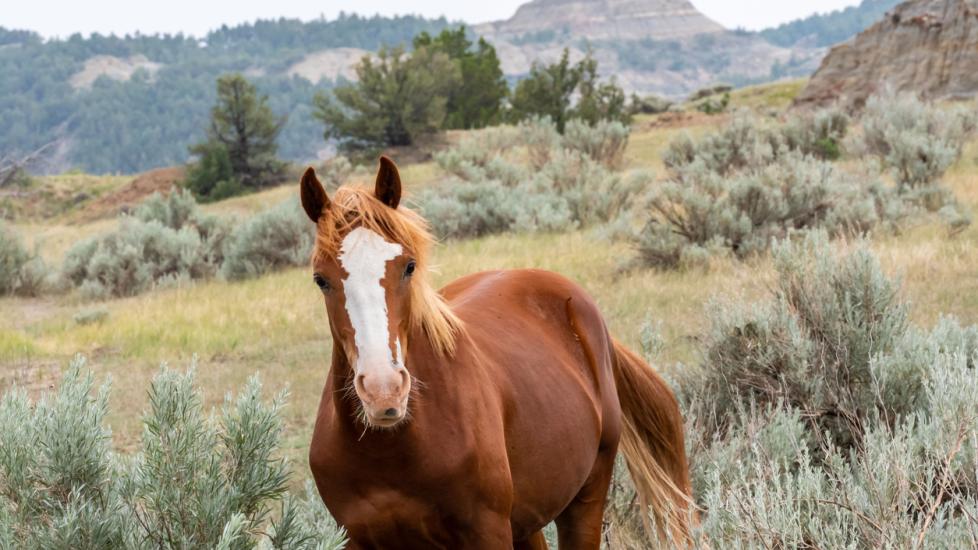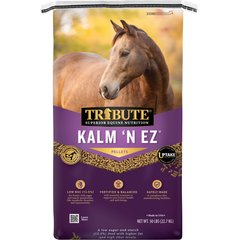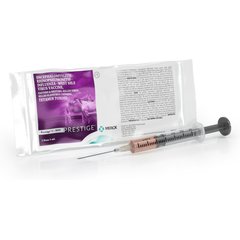Rabies in Horses
What is Rabies in Horses?
Rabies is a rapidly progressive neurologic disease caused by a virus called Lyssavirus. It is primarily carried by wildlife in the United States. While uncommon in horses, it is completely fatal in unvaccinated animals, and poses a significant health concern to humans.
Shop Horse Products
- Tribute Equine Nutrition Kalm N' EZ Pellet Low-NSC, Molasses-Free Horse Feed, 50-lb bag$25.49Chewy Price
- Nutramax Cosequin ASU Powder Joint Health Supplement for Horses, 2.86-lb tub, bundle of 2$279.98Chewy Price
- Absorbine ShowSheen Instant Detangling Hair Polish & Detangler Horse Spray, 32-fl oz bottle$17.84Chewy Price
- Prestige 5 + WNV Vaccine for Horses, 1-mL syringe$53.99Chewy Price
Symptoms of Rabies in Horses
Rabies has two major forms, paralytic and furious (also referred to as “mad dog” syndrome). Early signs may be vague or resemble mild colic, then may progress to any of these potential symptoms:
-
Ataxia (incoordination)
-
Weakness
-
Aggression or anxiety
-
Self-mutilation
-
Sensitivity to touch
-
Circling or head pressing
-
Decreased appetite or difficulty eating
-
Lethargy
-
Fever
After a horse contracts the rabies virus, it may lay dormant or incubate for two weeks or up to a few months. Once clinical signs begin, however, horses typically decline rapidly, passing on their own within 2-14 days at the longest.
Causes of Rabies in Horses
Rabies is caused by a Lyssavirus. Over 90% of rabies cases in the United States are caused by wildlife such as skunks, coyotes, raccoons, bats, and foxes. Rabies is transmitted through saliva via bite wounds, or the passage of saliva onto mucous membranes (gums, eyes, etc.) or breaks in the skin to any mammalian species, including humans. Once the virus enters the body, it migrates to the nervous system and causes inflammation of the brain or spinal cord, which leads to the wide range of potential clinical signs.
Some states with the highest numbers of recorded rabies cases include Texas, Oklahoma, Kansas, and Pennsylvania according to previous AAEP statistics.
How Veterinarians Diagnose Rabies in Horses
Unfortunately, rabies can only be diagnosed post-mortem (after death). Other differentials can be diagnosed with blood or cerebrospinal fluid laboratory tests. Rabies can be difficult to narrow down, especially in areas where it’s not common.
However, the rapid progression of clinical signs, lack of vaccination records, or history of exposure to wildlife bites, helps raise suspicion. Because this disease is reportable and poses a serious health risk to humans, after death any horse with an unknown vaccine history and neurological symptoms will have brain samples submitted for testing.
Treatment of Rabies in Horses
Rabies is invariably fatal in unvaccinated horses. Once clinical signs start to appear, conditions typically deteriorate rapidly over a few days’ time. Vaccinating is highly successful, and if a horse is up to date, they do not seem to contract the disease.
Recovery and Management of Rabies in Horses
Any horse that has been exposed to or bitten by a suspect rabid animal should be examined by a veterinarian immediately. Be very careful not to put your hands near or in your horse’s mouth, as the virus can be passed through saliva into any small break in your skin.
Your veterinarian will treat the primary bite wound and administer a booster rabies vaccine. If the wild animal in question is captured, it will be euthanized and submitted for rabies testing. Your state’s public health officials will be notified of all rabies cases by your vet, as this is a reportable disease and is zoonotic, meaning it can be transferred from animals to people.
Horses with an unknown vaccine history that have been bitten by a confirmed rabid animal must either be euthanized or quarantined for 6 months and monitored for any clinical signs. They will be vaccinated again one month before quarantine is over. Previously vaccinated horses should be monitored closely for any development of neurological signs for a length of time dependent on your state—typically about 45 days.
Prevention of Rabies in Horses
Vaccinating horses is the only way to prevent the development of clinical disease. The American Association of Equine Practitioners (AAEP) recommends to begin vaccinating for rabies at 4-6 months of age with a two-dose series in foals born from a mare that was previously vaccinated. In foals born to unvaccinated mares, a single rabies vaccine is given one time at 4-6 months of age. After that, yearly vaccination is recommended to maintain adequate protection for all horses. Exposing a horse’s immune system to a form of this virus equips it with appropriate antibodies that are needed if they ever encounter the live virus from a bite.
Rabies in Horses FAQs
What happens if a horse gets rabies?
If a horse contracts rabies and has not been appropriately vaccinated, this virus is fatal. If a vaccinated horse has been exposed to rabies, they must be monitored for an extended period of time and have their rabies vaccine repeated. This disease is reportable, so your veterinarian will be in close contact with your state’s veterinary medical office.
Can a horse recover from rabies?
If a horse begins to show clinical signs of rabies, this disease is always fatal. However, yearly vaccination significantly improves your horse’s odds of survival should they encounter a rabid animal.
Featured Image: iStock.com/Cheri Alguire




